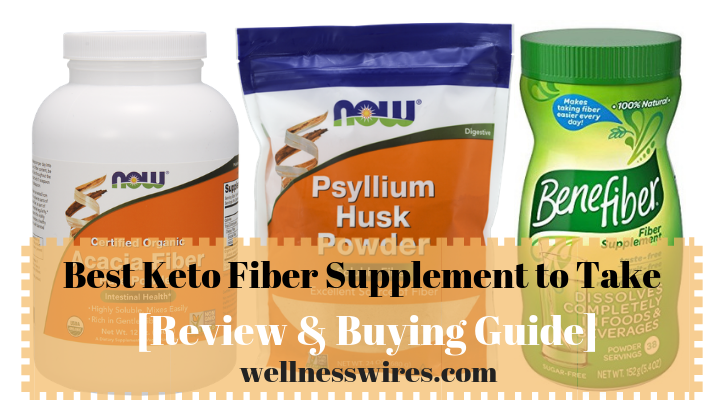
If you know that you have enough leafy greens and broccoli in your diet, but you are still bloated, constipated or have diarrhea and abdominal pain …
It can be the keto flu, which happens when your body starts burning fat for fuel instead of carbs.
And here is the thing…
Your GI upsets may even have nothing to do with the Keto diet.
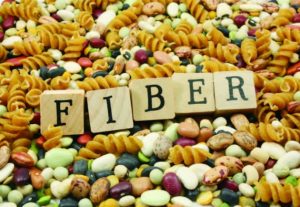
Plenty of people with IBS or chronic bloating chooses the Ketogenic diet because it’s one of the healthiest diet options out there.
As the keto community keeps growing in recent years, more people looking into keto-fiber foods and supplements.
The reason is that the keto diet excludes many fiber-packed foods because these are also rich in carbs.
So which are the best keto fiber supplements? Which are the best keto fiber foods?
Read below to find out…
We also have plenty of tips to improve your overall digestion.
Table of Contents
Best Fiber Supplements for Keto
Without further ado, here are the top fiber supplements that can fit in any keto meal.
#1 NOW Psyllium Husk Powder
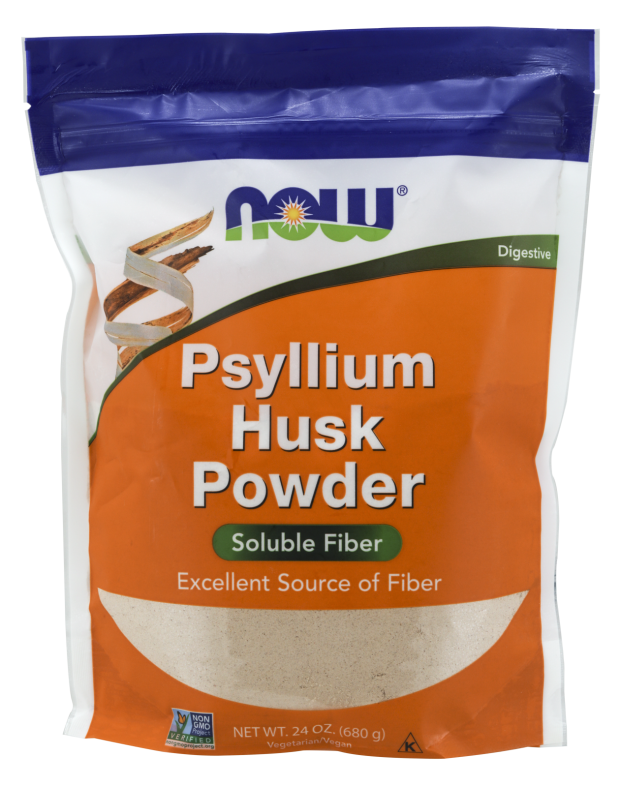
This Psyllium Husk keto-friendly fiber supplement is a form of soluble fiber. Its main benefits are to build muscle and to solve constipation problems.
Psyllium assists in weight loss and improves the health of your gut flora. Even better, these products are lab-tested every month. Psyllium soaks up a large amount of water within the digestive tract, which makes stool more firm and slows down excretion. Irritable bowel syndrome (IBS) involves a group of gastrointestinal symptoms including gas, abdominal pain, cramps and alternating bouts of constipation and diarrhea.
Consuming a high-fiber diet is a well-known treatment option for IBS symptoms, so a fiber supplement is often recommended for people suffering from IBS.
PROS
- Mild laxative
- Weight loss
- Healthy gut microbiome flora
- Affordable
- Extensively tested
CONS
- Psyllium Husk Need a blender to mix
- Not the best taste
.
Summary: Psyllium Husk Powder is the top fiber supplement for improving bowel movements and helping you lose weight.
#2 Viva Naturals Organic Ground Flaxseed
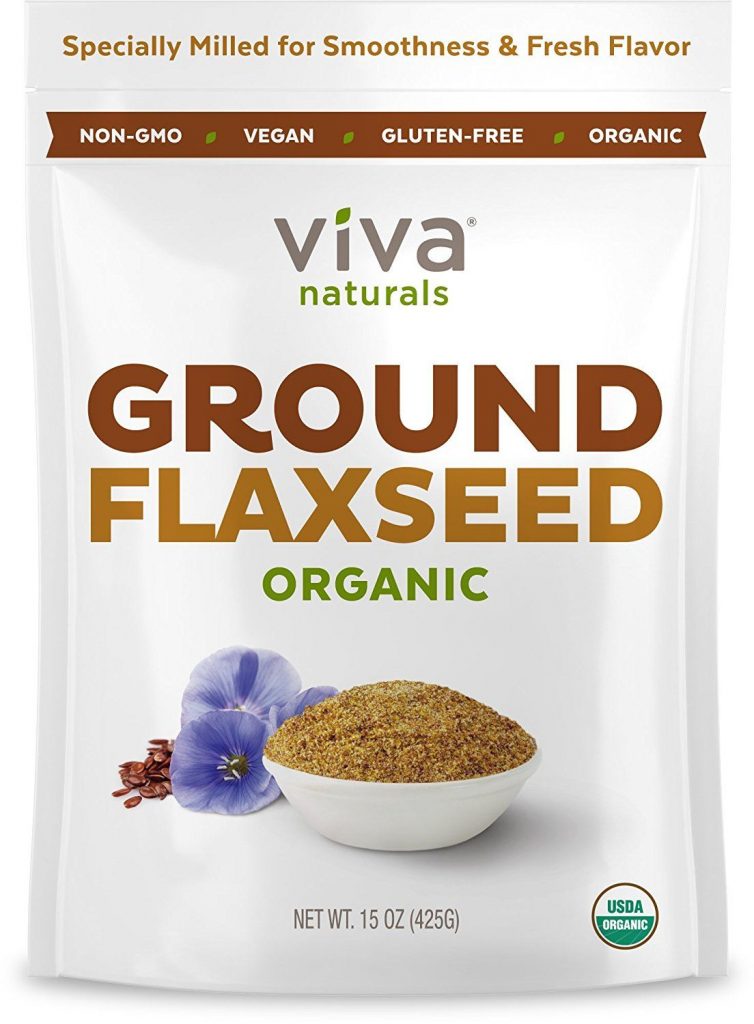
Flaxseed is rich in fiber and omega-3 fatty acids, as well as various nutrients.
Flaxseed contains 27% fibers and just 0.01% carbs, so keto dieters love it.
Viva Naturals flaxseed fiber powder is 100% organic, with minimum pesticides.
This supplement includes fine ground flaxseed which is easy to mix in your keto food.
With plenty of antioxidants that aid your immune system, Viva Naturals benefits your digestive system too.
PROS
- Easy to dissolve in water
- Nutrient-packed
- Weight loss
- Healthy gut flora
- Affordable
- 100% organic
CONS
- Flaxseed increased your estrogen production, so it shouldn’t be your only source of dietary fibers
.
Summary: Viva Naturals Organic Ground Flaxseed has various benefits, preventing any heart disease and stabilizing your body weight, but you need another source of daily fiber.
#3 Heather’s Tummy Fiber – Organic Acacia Senegal
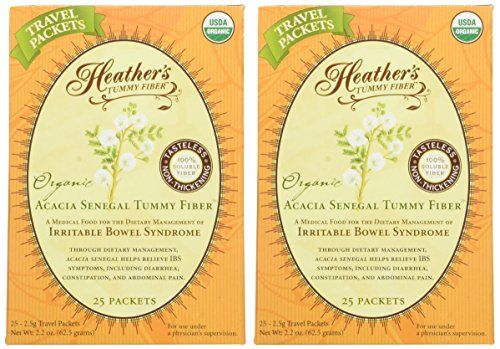
Heather’s Tummy Fiber is a supplement that can fit in any keto meal plant, but it’s intended for use under medical supervision.
This supplement has been devised to assist in treating the Irritable Bowel Syndrome and acts like a prebiotic.
This product keeps your digestive system healthy, relieving symptoms like pain, diarrhea, and constipation.
Heather’s Tummy Fiber is a USDA organic product, with no gluten and 100% fiber soluble.
PROS
- Easy to dissolve
- Plenty of health benefits
- Relieves pain
- Medical supplement
- Tastes good
CONS
- Requires medical supervision
- Requires time to act against constipation
.
Summary: Heather’s Tummy Fiber is a medical supplement devised against IBS.
#4 Benefiber Daily Prebiotic
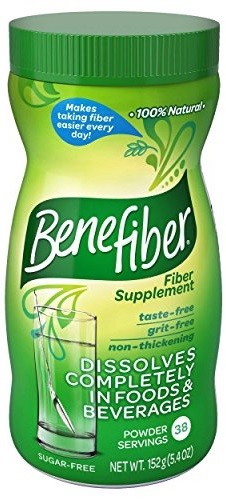
Benefiber Original is one of the best keto-friendly fibers. It’s 100% natural, and it acts like a prebiotic, so it maintains the health of your digestive system.
On the other hand, it takes longer to work against acute conditions.
You can add it to any food sources or drink, it has no taste and dissolves completely in water.
There are no gluten or sugar in Benefiber Original plant-based.
PROS
- 100% natural
- Prebiotic
- No taste
- Gluten-free
- Sugar-free fiber supplement
- Dissolves rapidly
- Can be mixed with any food or drink
CONS
- Some people complain about gas and stomach pain
- Takes a while to work
.
Summary: A natural prebiotic, Benefiber Daily is taste-free and dissolves quickly.
#5 Bob’s Red Mill Raw Whole Golden Flaxseeds
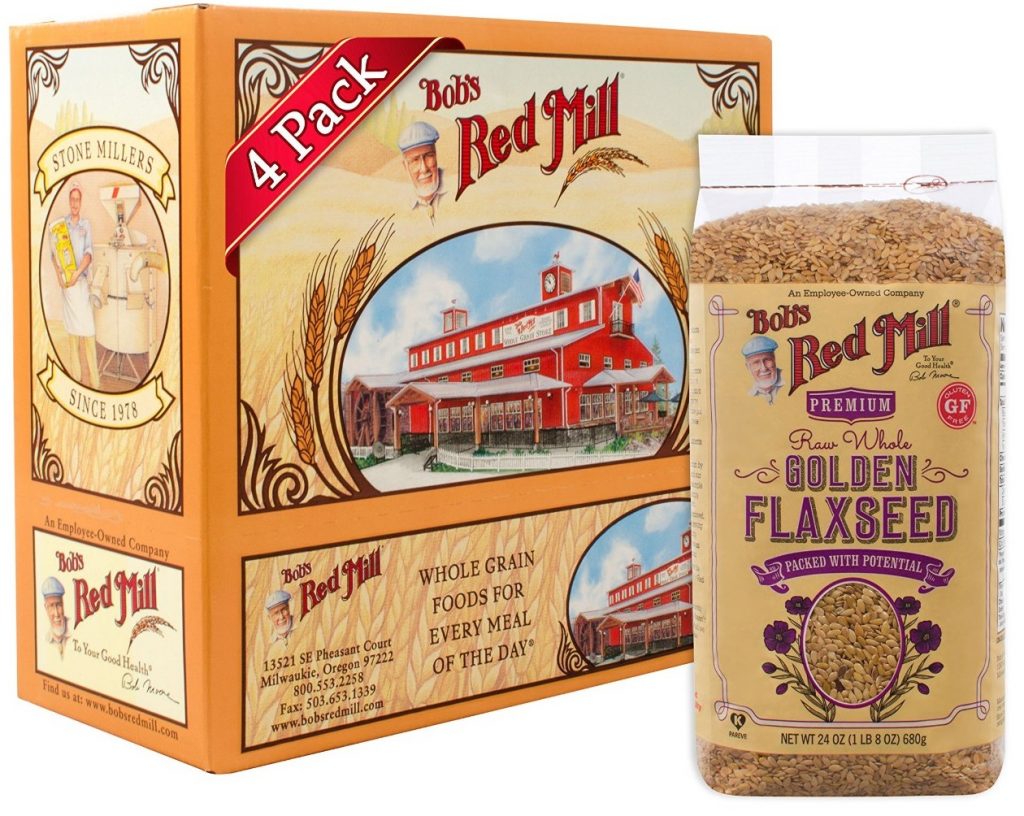
Flaxseed (Linumusitatissimum) is a good source of fiber and omega-3 fatty acids. This product contains lignans and 1800mg Omega-3.
It’s USDA-certified organic, with no gluten, and can fit various diets, including Vegan, Kosher, and Paleo.
You can use it in various ketogenic recipes to decrease your blood sugar and cholesterol, making sure you get enough fiber.
That way, you can lose weight, improve your bowel movements and diminish your hunger pangs.
However, Flaxseed is estrogenic, so you need another fiber source.
PROS
- Reasonable price
- No taste
- Decreases cholesterol fast
- Improves heart conditions
CONS
- Need another source of fibers
- Not dissolving in water
.
Summary: This supplement can decrease cholesterol and is an excellent addition to any low carb diet.
#6 Ancient Nutrition KetoFIBER Powder
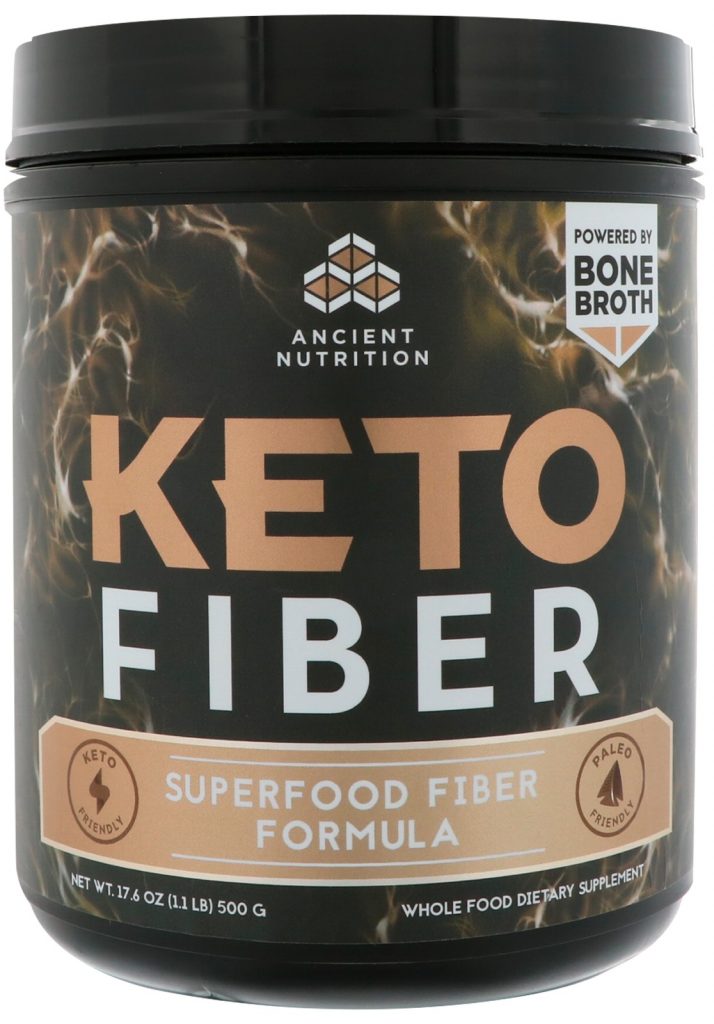
This keto-friendly fiber supplement contains a mix of organic superfoods rich in fibers, fermented herbs, and MCT oils.
It is one of the best products in its category, thanks to a blend of soluble and insoluble fiber, healthy coconut fats, minerals, and antioxidants.
Ancient Nutrition KetoFIBER Powder can fit any diet. It contains 40 calories, 5 grams of organic fiber per serving, and 2 grams of net carbs per serving.
I like how easy it is to mix it, the subtly sweet flavor, and the fact that it doesn’t bring you out of ketosis as other supplements do.
PROS
- Tastes good
- Nutrient-packed
- Good source of fiber
CONS
- Lumps up
.
Summary: Great for consuming enough fiber on low carb and the ketogenic diet, this is genuinely a keto multivitamin supplement.
#7 NOW Organic Acacia Fiber Powder
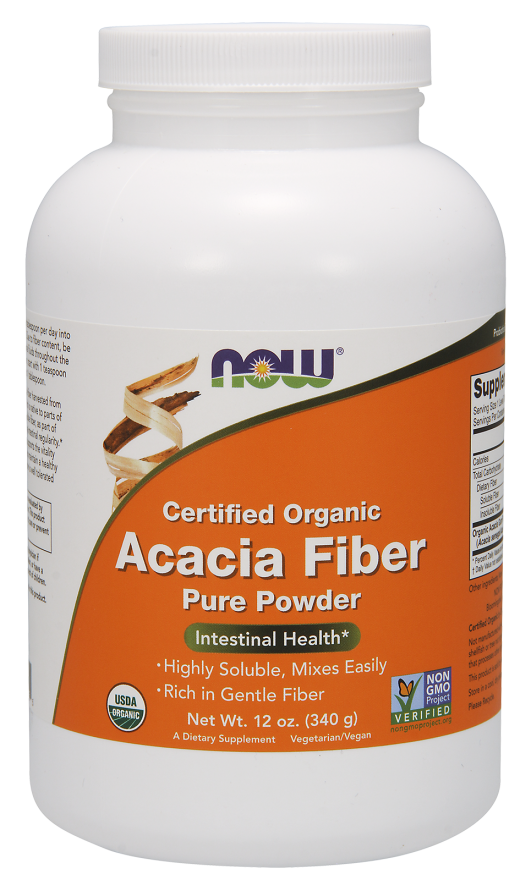
Acacia fiber is linked to numerous health benefits. Research from the American Journal of Cardiology found that Fifteen grams of acacia fiber taken daily helped with managing plasma cholesterol concentrations in blood.
Studies published in Nutrition Journal mentioned that consuming Thirty grams of acacia fiber powder for six weeks resulted in lowered body weight and body fat reduction by 2%.
Acacia fiber is a soluble fiber that contains 90 grams of fiber for every 100 grams.
The Organic Acacia Fiber Powder from NOW is organic, gluten-free, and easy to mix in smoothies.
This product has various health benefits. It can reduce your blood cholesterol, help you lose weight, and improve constipation.
PROS
- Fiber-packed
- Aids fat loss
- Improves cholesterol
- Anti-constipation
- Affordable
- Easy to mix
- Organic
CONS
- Not a great taste in water
.
What is Dietary Fiber?
Dietary fiber should be part of any meal plan because it prevents digestive problems like constipation or diarrhea.
You can find dietary fiber in vegetables, whole grains, and some fruit.
It isn’t entirely absorbed by your body, as opposed to carbs, proteins, or fats.
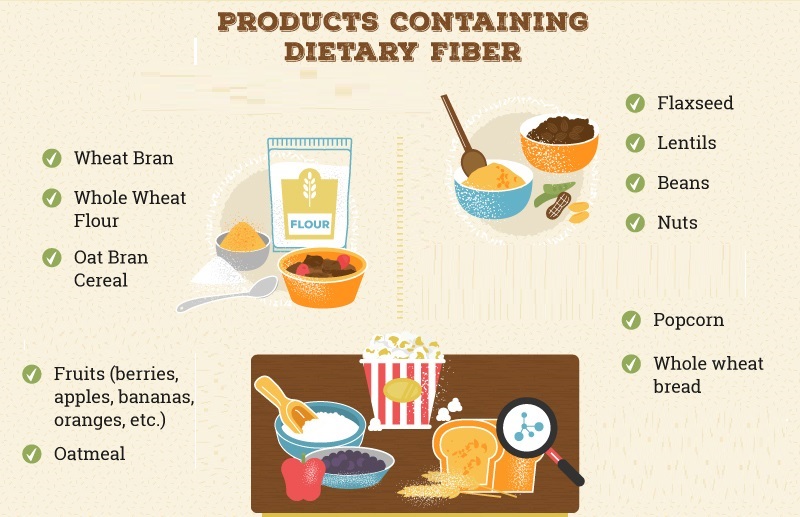
There are two types of fibers: soluble and insoluble.
Soluble fiber can dissolve in water and improves your blood cholesterol and blood sugar levels.
You can find it in apples, barley, beans, carrots, citrus, peas, and psyllium.
Insoluble fiber can’t be dissolved in water, passing almost intact through your digestive system. This type of fiber alleviates constipation.
You can find it in beans, cauliflower, nuts, potatoes, wheat bran, and whole-wheat flour. Benefiber is a 100% natural supplement made from wheat dextrin.
Is it OK to take Metamucil Keto every day?
Fat loss supplements come away down your shopping list lately, along with numerous different exercise routines to practice. There are probably a lot of Metamucil Keto in existence, which is a low-calorie, fast metabolizing fiber that probably ought to be included in every diet for you to decrease hunger, experience low gas, and begin shedding pounds, if you don’t already. Since Metamucil Keto is so widely available and natural, it’s likely to be there in your house already, waiting for you, which you could probably use in any amount you want. Indeed, sometimes, you ought to take some Metamucil Keto each day to assist burn fat at every spot. But should you really be going that way?
If you want to avoid all the empty calories and other unhealthy side effects, this is where it’s imperative to figure out if the amount of Metamucil Keto you take every day is truly justified. Consider taking Metamucil Keto before every workout, as this will help flush out the excess fuel and grease from your body and lead to more intense fat burn in a shorter period of time. This Metamucil Keto Keto On The Way To Lose Weight review could be vital in helping you shed a pound or two each month.
If you take Metamucil Keto before and after a workout, you may end up with severe abdominal cramps or flatulence, if you’re not using it correctly. This can be a sign that you’re not properly using this Metamucil Keto to reduce your overall calorie intake. It is a lot better to get rid of the unwanted fat in your body by burning it, rather than feeding it to it through water retention. The primary function of this Metamucil Keto Keto Review is to aid in the elimination of digestive gases and consume high quantities of dietary fiber so that your digestive system and colon could be in top shape for fat loss. Fat loss could be a sign that your gut has lost its natural capacity for digestion and absorption.
Metamucil Keto Keto will help up your weight loss process. The bulk of the weight you will lose when losing weight could happen from fat storage in your muscles, skin, and internal organs. These fat reserves would have been stored in your bloodstream and abdomen, so even though you lose fat in the surface area of your body, the net result will be that you can lose a few pounds. That is the only thing Metamucil Keto helps you do, and in very simple words, this Metamucil Keto On The Way To Lose Weight review helps you burn fat faster.
Best Kind of Fiber – A List of Foods
You need to eat a wide variety of fiber-rich foods to make sure you get the best kind of fiber.
You also need to take into account that these foods have little carb per serving, so you can still follow the ketogenic diet.
Without further ado, the best foods with a low carb fiber content are:
High-Fiber Cereals
Collard Greens
Broccoli
Cauliflower
Blackberries
Unsweetened Coconut
Fiber Intake / How Much Fiber Should I Have on a Keto Diet?
It is easy to find in beans, apples, carrots, broccoli, Brussel sprouts, oranges, oats, flaxseed, and brown rice.
As you can gather, not a lot of these food items are keto-friendly, except for some of the vegetables.
Even worse, vegetables don’t have nearly as many fibers as non-keto-friendly foods like beans, bran, lentils, or whole grains.
That’s why following the ketogenic diet can be dangerous for your fiber intake. Chia seeds also contain a high amount of fiber and are considered to be one of the high-fiber foods.

But how much exactly is that? Women and men have different needs in terms of fiber content.
While women require 25 grams of fibers daily, men require about 38 grams.
So, if you want to reap all the benefits of your ketogenic diet, as well as get enough fibers, you need a keto-friendly fiber supplement.
You can mix it in your meals, dissolve it in water before eating to relieve digestive issues or mix it in a smoothie for a snack.
Benefits of Fiber Supplements
Fiber supplements have various advantages. They can improve your:
Overall Health

It isn’t absorbed in our bodies, so they travel almost intact through our intestines.
It is home to about 100 trillion good bacteria who aim to protect their home, aka our bodies.
These good bacteria thrive on fibers so that they can fight better against outside bacteria and viruses.
Therefore, consuming supplements boost your immune system, decreases the risk of various illnesses, and supports brain health.
Weight Loss Progress
 Soluble fiber especially can help you lose weight.
Soluble fiber especially can help you lose weight.
When mixed with water, they transform into a sort of gel, which decreases the pace at which your body absorbs food.
It means that you’ll feel full for longer and won’t feel any hunger pangs when you’re dieting.
Blood Sugar Levels
Dietary fibers decrease food absorption, which means the nutrients in your food – including carbs – will be metabolized slower.
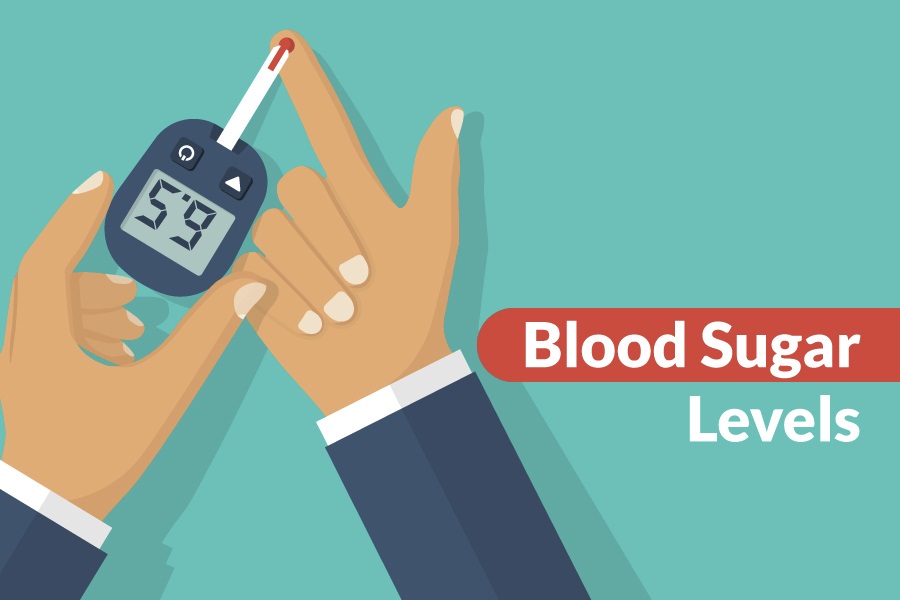
And since carbs will turn into glucose at a slower rate, this means your blood sugar levels will be stabilized.
Digestive Issues
Most digestive issues are caused by the lack of good bacteria lining your guts.
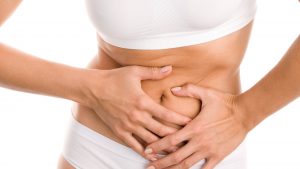
Giving them fiber increases their numbers, which means your digestive problems are easily improved.
Constipation, on the other hand, is directly caused by the absence of fiber in your diet because the bowel movements don’t have the right consistency.
In a keto diet, constipation is a direct result of eating too many fats and proteins. That’s why eating fibers are essential in any keto diet.
Cholesterol Levels
High cholesterol levels are a problem among Keto dieters.
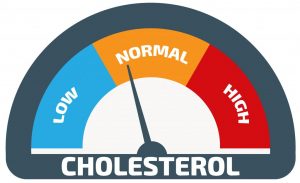 However, it has been shown that total cholesterol and bad cholesterol levels are decreased after eating soluble fiber.
However, it has been shown that total cholesterol and bad cholesterol levels are decreased after eating soluble fiber.
It has to do with decreased nutrient absorption as well as reduced hunger pangs.
After all, if you’re not hungry, you don’t have an excuse to snack.
More Tips for Improving Digestion on Keto
If you’re following the ketogenic diet, you might have problems with digestion.
It is called Keto flu, and you can get it, especially at the beginning of your keto diet when your body is entering ketosis.
Sometimes, a low-carb supplement can improve your digestive issues.
But some of these products can take time to work. What can you do in the meantime to improve your digestion?
Stay Hydrated
Make sure you drink plenty of water, at least half a gallon daily.
Water improves the consistency of your stools and supports your overall health.
Mind Your Electrolytes
Electrolytes are nutrients that your digestive system needs to work correctly.
Most of these nutrients are found in non-keto foods, so you need to supplement your electrolyte intake with minerals like magnesium, potassium, and sodium.
Keep Active
Exercise strengthens your abs and intestinal muscles.
Exercise relieves constipation because it helps food pass through your digestive system faster.
Running is an especially beneficial exercise for your digestive health.
Sleep Properly
Stress and anxiety are related to various digestive issues, including constipation and diarrhea.
If you sleep properly, you can reduce stress, which alleviates your GI problems.
Consider Allergies
Sometimes, digestive upsets are caused by allergies. Do a full workup to make sure that’s not the case.
Extra Fiber
It’s possible that overeating fiber can cause gastrointestinal upsets.
Mind the recommended daily amount to avoid diarrhea, bloating, and pain.
What is Metamucil? / Metamucil on Keto?
Metamucil is a fiber supplement that consists of psyllium husk powder.
The other ingredients are sucrose and a bit of sodium. There are 2.4 grams of soluble fibers for each dose of 7 grams.
Looking at these ingredients, the first thing you can notice is that sucrose is table sugar.
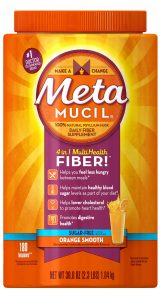
Another thing is that Metamucil has no other nutrients that could help your overall health, except a bit of sodium.
That’s why it’s better not to take Metamucil on a Ketogenic diet. Look for other fiber sources, including organic inulin fiber.
Good food items are unprocessed wheat bran and plain psyllium husk. If you have problems with constipation, steak, eggs, and chicken meat can help correct that.
Besides, these food items have plenty of protein, fat and a few minerals to consider.
However, the orange sugar-free option is a sort of Metamucil Keto.
If there’s no sugar, Metamucil is okay. However, don’t take it with your high-fat meal, or it might absorb the fats.
.
Why Am I Still Constipated After Eating Fiber?
You just ate a large amount of fiber and went to the bathroom and you were STILL constipated. Why is this happening to you? Fiber is fine for some people, but for others, it doesn’t really work. It’s one of those things where everyone will tell you it’s the best thing you could ever eat and that your bowel will expand overnight. It’ll make it all much easier. You’ll get stool like your grandma. Let me tell you, it doesn’t work that way. In my opinion, you should do a little experiment, and try to eat a similar amount of fiber without any hard changes in your diet. So you’ve got a big breakfast of oatmeal, a hard-boiled egg, a slice of toast, and a big glass of milk.
A bowl of Wheaties. The best thing you could ever eat! Go home, and have a big bowl of fiber cereal, then another bowl of fiber cereal, and finish it off with another bowl of Fiber One cereal. You’re eating the same amount of prebiotic fiber as you did when you ate breakfast at 8 am. Have a good poop by 9 am. At 10: 30 am, eat a big lunch, and another big bowl of fiber cereal.
Insoluble Fiber Supplements
Insoluble fiber (proprietary name: pectin) is basically fiber that doesn’t dissolve in water. Proprietary names that are widely accepted include mannose (also called high-fiber), resistant starch, oligofructose, and xylooligosaccharides (XOS). In addition, carbohydrate (sugar) soluble fibers (fructo-oligosaccharides, dextrins, and oligosaccharides) and protein soluble fibers (proteins) are also used as foods and supplements, so technically a food that doesn’t dissolve in water also counts as a fiber.
Insoluble fibers help naturally reduce blood sugar, slow down the rate of digestion, promote weight loss, and boost fiber digestion. Because soluble fiber is typically found in high doses in cereal grains and in fruits and vegetables, those foods are the best choices. Unfortunately, less than 5 percent of Americans get the recommended 25 g a day of soluble fiber.
What is Better Than Metamucil?
Our team of experienced professionals is willing to give you the best recommendation we can. In this case, as we are talking about the best Metamucil, then we are saying this item is the best in this situation. This will make sure that you do not experience any sort of discomfort with this method. Procedure to Follow. First of all, you must start by adding the required quantity of water into a big bowl. Then, pour the powder inside the bowl. Make sure that you add this item in a place that is out of the reach of children. You should also change your mindset and remember that you are the sole person that will have the ability to choose the right decision regarding the use of this item. You must avoid doing things that could cause injuries, in particular, when the bodily fluid level is low.
What Fiber Supplements Do Doctors Recommend?
Fiber-rich foods like wheat bran, oats, beans and lentils, almonds, apples and walnuts, and broccoli are your best bets for an all-around balanced diet of fiber. Here’s a breakdown of the different types of fiber: Fiber-rich foods can be broken down into four main groups: soluble, insoluble, viscous, and gas-inclined. Soluble fibers, found in fruits, vegetables, whole grains, beans, and nuts, take longer to digest and leave you feeling full for a longer period of time, leaving you with fewer cravings for sweet foods.
The downside is that they can cause gas in the gut, so check with your doctor before adding more fiber to your diet. Insoluble fibers, found in meat, nuts, and seeds, tend to be easier to digest and keep you fuller longer. They also help lower your cholesterol levels. Viscous fibers are found in oats, beans, peas, and lentils. They are similar to soluble fibers and tend to improve bowel movements and increase satiety, which can help improve overall.
Frequently Asked Questions
Which is Better Metamucil or Fiber Pills?
The choice between Metamucil and fiber pills depends on individual preferences, needs, and specific health conditions. Both Metamucil and fiber pills are sources of dietary fiber, which is essential for maintaining a healthy digestive system. Metamucil is a brand name for a specific type of fiber supplement that contains psyllium husk, a soluble fiber. Fiber pills, on the other hand, may contain various types of fiber such as psyllium, methylcellulose, or wheat dextrin.
Metamucil is known for its ability to promote regular bowel movements and relieve constipation, thanks to its high soluble fiber content. It can also help lower cholesterol levels and regulate blood sugar levels. Fiber pills, depending on the specific type of fiber used, may offer similar benefits.
The choice between Metamucil and fiber pills can depend on factors such as taste preferences, convenience, and tolerability. Some individuals may prefer the texture and taste of Metamucil, which can be mixed with water or other liquids. Fiber pills, on the other hand, offer convenience and portability, as they can be easily taken with a glass of water.
It’s important to note that individual responses to fiber supplements can vary. Some individuals may find Metamucil more effective in promoting bowel regularity, while others may prefer the simplicity and ease of taking fiber pills. It may be helpful to experiment and find the option that works best for you, considering factors such as personal preference, effectiveness, and any specific dietary restrictions or sensitivities.
Ultimately, the effectiveness of both Metamucil and Garden of Life fiber pills in improving digestion and overall health depends on incorporating an adequate amount of dietary fiber into your daily routine. It is advisable to consult with a healthcare professional or registered dietitian for personalized recommendations based on your specific needs and health conditions.
When to Take Fiber Supplements?
The timing of when to take fiber supplements can depend on various factors, including the specific supplement and individual preferences. It is generally recommended to take fiber supplements with meals or shortly before meals. This allows the fiber to mix with the food in the digestive system and aids in its proper breakdown and absorption.
Taking fiber supplements with meals can also help control blood sugar levels by slowing down the absorption of sugars from the meal. Additionally, consuming fiber supplements with meals can promote a feeling of fullness and satiety, which may be beneficial for weight management.
However, some individuals may find it more convenient to take fiber supplements at a different time, such as with a glass of water or another beverage. This can still provide the desired fiber intake and offer the benefits of promoting regular bowel movements and supporting digestive health.
It’s important to follow the instructions provided by the specific fiber supplement and consult with a healthcare professional or registered dietitian for personalized advice. They can provide guidance based on your individual needs, any underlying health conditions, and considerations regarding other medications or supplements you may be taking.
Remember that while fiber supplements can be a convenient way to increase fiber intake, it’s always preferable to obtain dietary fiber from whole, nutrient-rich foods such as fruits, vegetables, whole grains, and legumes. A well-balanced diet that includes a variety of fiber-rich foods is the foundation for maintaining a healthy digestive system and overall well-being.
Can You Take Psyllium Fiber on Keto?
Yes, you can take psyllium fiber on a ketogenic diet. Psyllium fiber is a natural, soluble fiber derived from the husks of Plantago ovata seeds, commonly known as psyllium husk. It is an excellent addition to a keto diet for several reasons.
- Low Net Carbs: Psyllium fiber is very low in net carbohydrates, making it a suitable choice for individuals following a ketogenic diet. While it contains total carbohydrates, most of these are dietary fiber, which doesn’t significantly impact blood sugar levels. The primary component of psyllium husk is fiber, and it provides little to no digestible carbohydrates.
- Digestive Health: Psyllium fiber is renowned for its digestive benefits. It can help alleviate common gastrointestinal issues that some people experience when transitioning to a keto diet, such as constipation. It works by increasing the bulk and softness of stool, making it easier to pass and promoting regular bowel movements. This is particularly valuable since some individuals on a ketogenic diet may consume less dietary fiber from other sources.
- Blood Sugar Regulation: While the ketogenic diet is generally designed to control blood sugar by limiting carbohydrates, psyllium fiber can provide an additional layer of support. It has been shown to have a minimal impact on blood sugar levels and may help stabilize glucose responses to meals, making it a useful tool for those with diabetes or those aiming to maintain stable energy levels on keto.
- Satiety and Weight Management: Incorporating psyllium fiber into your keto diet can enhance feelings of fullness and satiety. It absorbs water and expands in the stomach, promoting a sense of fullness that can help control appetite and reduce overall calorie intake, which can be beneficial for weight management.
When adding psyllium fiber to your keto regimen, it’s essential to do so gradually and consume it with plenty of water to avoid potential digestive discomfort. Additionally, ensure you choose a pure psyllium husk product without added sugars or carbohydrates, as some commercial psyllium supplements may contain fillers that could impact your net carb intake.
In summary, psyllium fiber is keto-friendly and offers several advantages, including its low net carb content, digestive health benefits, blood sugar regulation, and potential aid in weight management. It’s a valuable tool for enhancing your ketogenic diet’s overall effectiveness and promoting a well-rounded approach to health and wellness.
Is there a Downside to Taking Metamucil?
Metamucil, a popular dietary supplement, is primarily composed of psyllium, a soluble fiber derived from the husks of the Plantago ovata plant’s seeds. While Metamucil is widely recognized for its benefits in improving digestion and regulating bowel movements, it’s essential to understand the potential downsides associated with its use.
One common side effect of Metamucil is bloating and gas. These symptoms can occur as the body adjusts to an increased intake of fiber, especially if one’s diet was previously low in fiber. To minimize these issues, it is advisable to start with a smaller dose of Metamucil and gradually increase it, allowing the digestive system to adapt.
Another potential downside is the risk of intestinal blockages. Psyllium fiber requires a substantial amount of water to swell and move smoothly through the digestive tract. Insufficient hydration can lead to hard stools and potentially serious blockages. Therefore, it is crucial to consume plenty of water when taking Metamucil to ensure it functions properly and to prevent digestive complications.
Allergic reactions to psyllium, though rare, can also occur. Symptoms of an allergic reaction may include rashes, itching, swelling of the face, lips, or tongue, and difficulty breathing. If any of these symptoms appear, it is important to seek medical attention immediately.
Furthermore, Metamucil can interfere with the absorption of certain medications. The soluble fiber in psyllium can bind with some drugs, reducing their efficacy. To avoid this interaction, it is generally recommended to take Metamucil at least one hour before or two hours after other medications.
Long-term reliance on Metamucil without medical advice might lead to a dependency on the supplement for regular bowel movements. The body may become less efficient at regulating bowel movements naturally if it becomes accustomed to the fiber supplement.
Overall, while Metamucil can be a beneficial addition to many people’s diets, it is important to use it with caution and according to dosing instructions. Ensuring adequate hydration, being aware of potential medication interactions, and consulting with a healthcare provider before starting Metamucil are key steps to avoid potential negative effects. Understanding these considerations helps in making an informed decision about using Metamucil as a fiber supplement.
Which Fiber Supplement Is the Best?
IMHO, NOW Psyllium Husk Powder is the World’s #1 fiber supplement.
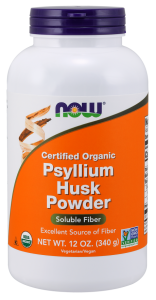 It’s versatile, relieves several stomach problems and, it’s been extensively tested plus it is affordable.
It’s versatile, relieves several stomach problems and, it’s been extensively tested plus it is affordable.
However, make sure you eat plenty of foods that contain fiber and follow the medical advice above to improve your digestion.
Other than that, which fiber supplements have you taken before?
What low-carb fiber-rich foods do you enjoy the most? What tips do you have to improve digestion?
Let’s talk in the comments below!
